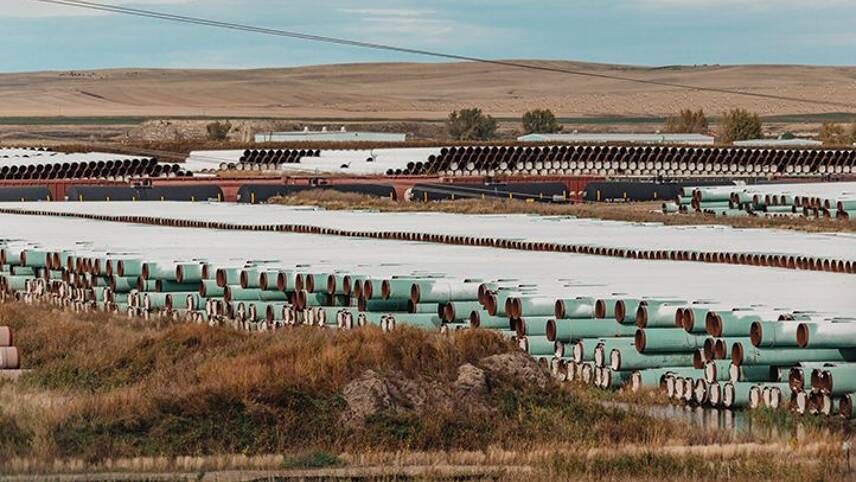Register for free and continue reading
Join our growing army of changemakers and get unlimited access to our premium content

CDP and Planet Tracker warn that the financial support for key projects such as the Keystone oil pipeline at Canada could all suffer due to heightened cases of water stress and contamination
New research from non-profits CDP and Planet Tracker has tracked the exposure of financial institutions in relation to water risks. The research warns that changes to regulations, high levels of contamination and pollution and community opposition to some major projects are causing some investments to be deemed stranded assets.
The research, which focused on the oil & gas, electric utilities, coal, and metals & mining sectors, found that $13.5bn in assets are considered stranded on water grounds, with a further $2bn at risk.
CDP and Planet Tracker warn that the financial support for key projects such as the Keystone oil pipeline in Canada could all suffer due to heightened cases of water stress and contamination.
The controversial Keystone project has faced waves of environmental protests and legal battles, which the research claims has already written off $6bn. Elsewhere, the Pascua-Lama gold mine on the Argentinian border has lost $7.5bn, while Australia’s Adani coal mine is at risk of a further $1.2bn in stranded assets.
According to the research these notable projects are merely the “tip of the iceberg” with the climate crisis set to exacerbate demand for water in the future. Indeed, the UN estimates that there will by a 40% shortfall in global water supply by 2030.
CDP’s global director of water security Cate Lamb said: “The global water crisis is happening right here and right now. Companies are already losing billions in revenue due to failing to factor water security into short, medium and long-term strategic decision making. Our new research shows that the situation is resulting in significant financial impacts not only for the companies but for those financing them. Financial institutions need to understand how exposed they are to these risks and take immediate steps before it’s too late.
“This is a crisis which is playing out in real-time and with real life consequences. For too long it’s been assumed that water supplies will always be there in abundance. This mindset has led many of the world’s freshwater aquifers to breaking point. We need to stop financial flows to risky infrastructure projects which are already hemorrhaging cash.”
Company crisis
The research also outlines that financial institutions are linked to 42 of the world’s most “water-impactful” companies, largely through shareholdings or lending activities.
The analysis warns that the top 20 global ultimate owners hold a combined $2.7trn in companies deemed as high risk based on water.
The top 20 financial firms analysed had provided more than $2.5trn in bonds, loans and equity financing in the last decade, while the top 28 bondholders hold more than $30bn.
The research warns that more than $320bn worth of financing arrangements will need to be renegotiated and refinanced over the coming years.
CDP has previously warned that some $301bn of business value is at risk because of water stewardship challenges, yet it would take corporates just $55bn to deliver appropriate mitigation and adaptation initiatives.
CDP is warning that most companies are unable to prove they are doing enough to combat the most pressing water-related issues and minimise the related risks. More than one-third of the respondents increased water withdrawals, and more than 95% were not able to evidence progress against pollution targets.
CDP is warning that better measurement and disclosure of water-related risks, along with increased investment in mitigation and adaptation measures, will be needed to avoid major financial risk. It has calculated that the businesses disclosing collectively stand to lose $301bn of value by 2050 without greater ambition and action. Losses could result from physical damage or from transition risks, including a loss of investor interest. Investors managing $110trn of assets collectively support CDP’s water security questionnaire.
This is despite the fact that delivering an appropriate response to challenges like water stress, water scarcity and pollution could cost just $55bn – one-fifth of the amount associated with the risks.
It comes as the UK’s water industry has called on businesses and households to be more aware of water usage, amid forecasts from the Met Office that warmer, drier weather is on the way.
However, Water UK hasn’t yet warned that interventions, such as a hosepipe ban, need to be introduced.
“With the Met Office predicting a drier than usual May, we’re urging everyone to make every drop count because water is worth saving today, tomorrow and for the future,” Water UK’s chief executive Christine McGourty said.
“Clean, fresh water is an invaluable resource, so making small changes to our everyday routines at home, on holiday or in the garden can make a big difference to our water supplies.”


Please login or Register to leave a comment.